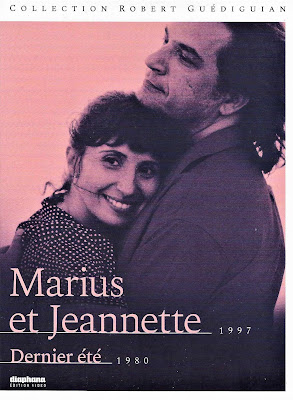Marius et Jeannette is by far the most popular and well known of Robert Guédiguian's (at present) twenty-one films, obviously in part because it is essentially a love story – albeit not of young people – with an upbeat ending. There are no murders in this delightful and perhaps surprisingly humorous conte de l'Estaque, and the slowly emerging relationship of the two key players are set in the courtyard so familiar to Guédiguian and Meylan in their youth, along with the director's usual troupe of potes (mates) backing them up.
And as usual, the precariat* is foregrounded: Marius (Gérard Meylan) is a warden at a soon-to-be-demolished cement works, and has secured the job by pretending to have a leg injury. Jeannette (Ariane Ascaride) is struggling on her supermarket cashier's salary, supporting her two children by different partners, the young Malek (Miloud Nacer) and Magali (Laetitia Pesenti): Magali's father left them, and Malek's died. At first Jeannette has tried to 'steal' two abandoned tins of white paint from the works, and although Marius prevents her he later brings two tins to her home and even begins helping her to decorate: Jeannette initially seems more keen on him than he does her, although he eventually moves in with the approval of her son and daughter and her neighbours.
Her neighbours are Dédé (Jean-Pierre Darroussin) and Caroline (Pascale Roberts), and Justin (Jacques Boudet) and Monique (Frédérique Bonnal). When Marius disappears Jeannette spies on him at the quarry, a former teetotal man glugging from a large bottle. It's down to Dédé and Justin to seek him out, get drunk with him, eke out his secret reluctance to face a new family after his wife and children have died in a car crash, but with almost comic book humour they drag the unconscious Marius to bed, 'strapping' him to the sleeping Jeannette with a sheet.
We first came across words by poet René Char – who lived in Provence and was buried in the family grave in L'Isle-sur-la-Sorgue – in a very different context in Ki lo sa ?, although in this film we see Marius reading a poem of Char's to Malek. We later learn that Malek became a teacher (professor? both French and American English words are ambiguous) of Arabic, and Magali becomes a journalist. The future takes on a rosy tint, even an international one as witnessed by the large plastic globe floating past a docked ship at the beginning of the film.
*Again, Guy Standing's term serves as a very useful tool to describe the characters.




No comments:
Post a Comment